Health
The Sugar That Killed My Mother: A Generation Drowning in Cheap Drinks, Cigarettes and Lies
Published
12 months agoon
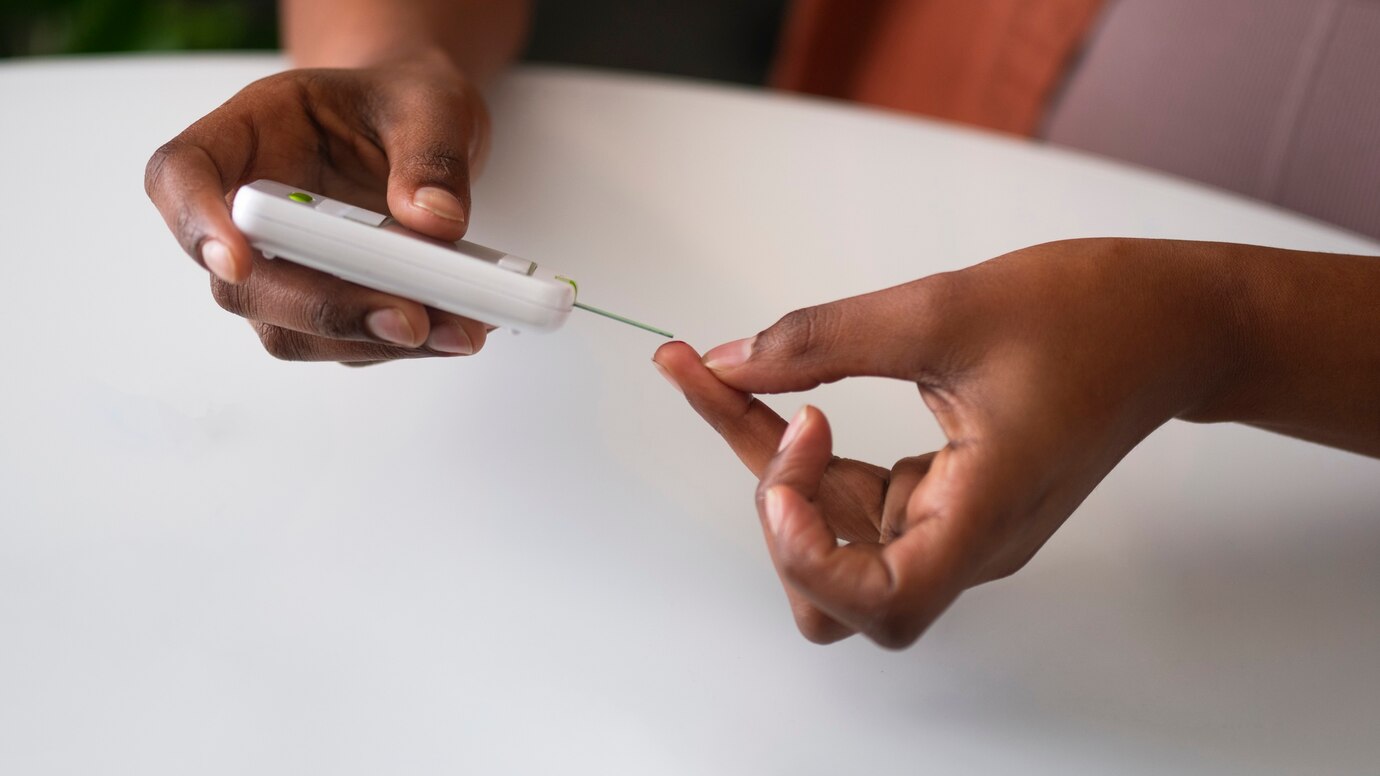
On October 15, 2021, the beep of a glucose monitor flatlined in our living room. My mother, Rebecca Nabiteeko (R.I.P.), took her last labored breath as her veins, swollen, burning, and numb, finally surrendered to a decade-long siege by diabetes. Her final days were a cruel liturgy: mornings began with insulin injections, and nights ended with prayers to a God who never answered. “Nsaba Yezu, mpone obulwadde bwa sukaali,” she prayed for deliverance from the sugar sickness. The same sickness that caused numbness of her feet, then her sleep, and finally her life. I miss her.
In our little cramped Kyebando-Kisalosalo home, medication such as pregabalin, Metformin, and Insulin Mixtard—became part of the day’s meals and everyday companions as relatives. We memorized their shapes: the amber vials crowding the dining table, the syringes tucked like shrapnel in drawer corners. Her body was a battleground. Her faith, a fragile ceasefire.
Her story is not unique. It is now becoming every household’s and a Ugandan story. Our country is under attack! While HIV, cholera, and malaria dominate headlines, a quieter killer stalks Uganda: non-communicable diseases (NCDs) like diabetes, hypertension, and cancer now claim 1 in 3 lives, eclipsing infections as the nation’s grim reaper.
“Our clinics are grappling with constant drug stockouts. For hypertension, diabetes, and asthma medications, funding covers just 2% of the actual needs,” reveals Dr. Freddie Ssengooba, a professor of health economics at Makerere University School of Public Health (MakSPH).
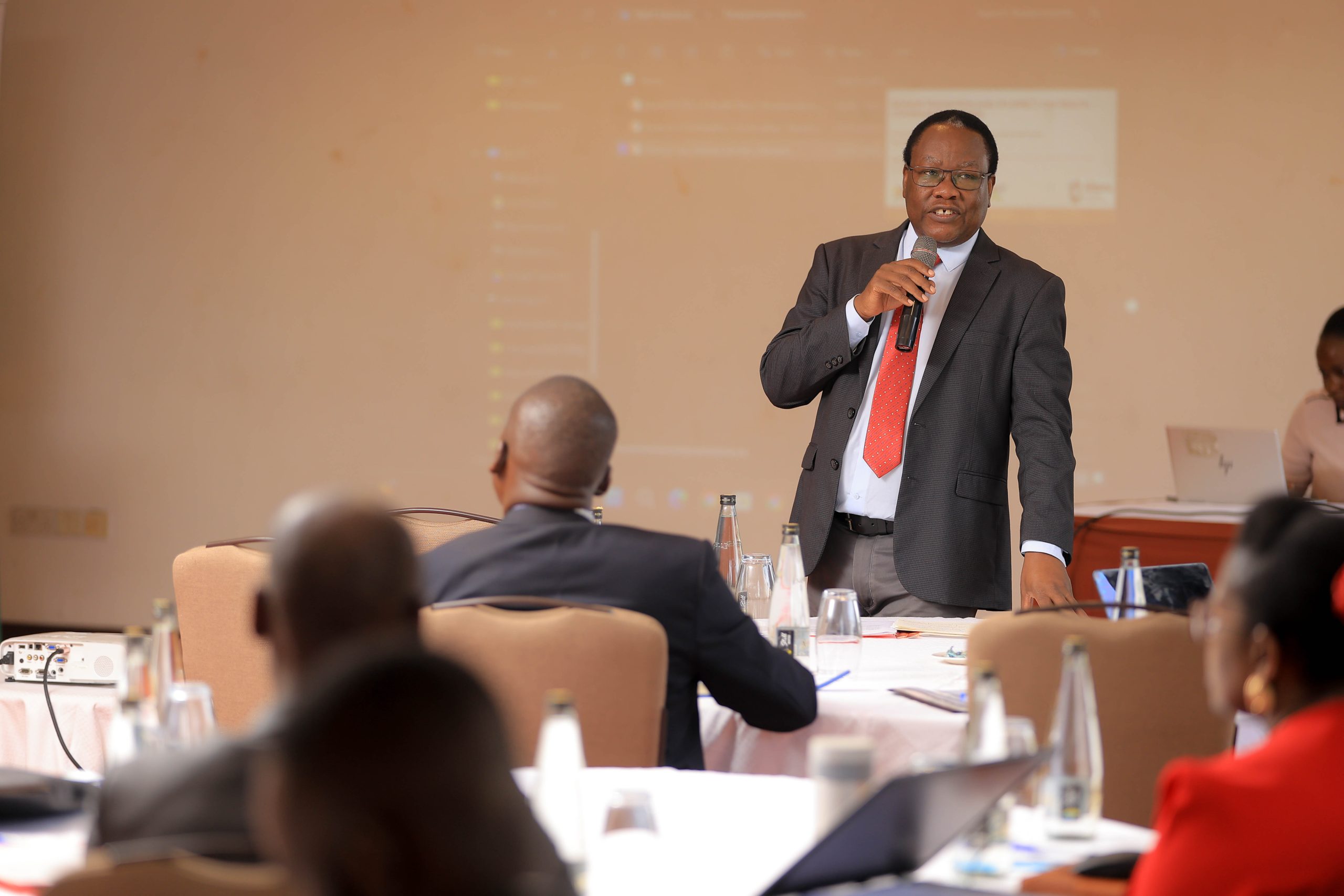
In one of the Health Policy Advisory Committee (HIPAC) meetings of Uganda’s Ministry of Health, where key stakeholders gather, a concerning reality about medicine availability was shared.
In schools, teenagers trade 500-shilling cigarettes like sweets. In markets, soda and unregulated sweetened juices flow cheaper than clean water. Uganda’s health system, already strained by several public health issues, is buckling under the NCD surge. “80% of the early 335 COVID-19 deaths in Uganda had NCD comorbidities as an underlying condition,” stated Dr. Eric Segujja, a public health systems researcher, while coronary heart disease, once rare in Africa, now claims 12% of Uganda’s disease burden.
This is a plague of policy, profit, and paralysis, a war where lobbyists outgun public health advocates and sugar drowns out science. My mother didn’t just die of diabetes. She died in a system that incentivizes manufactured epidemics while pushing back on public health responses.
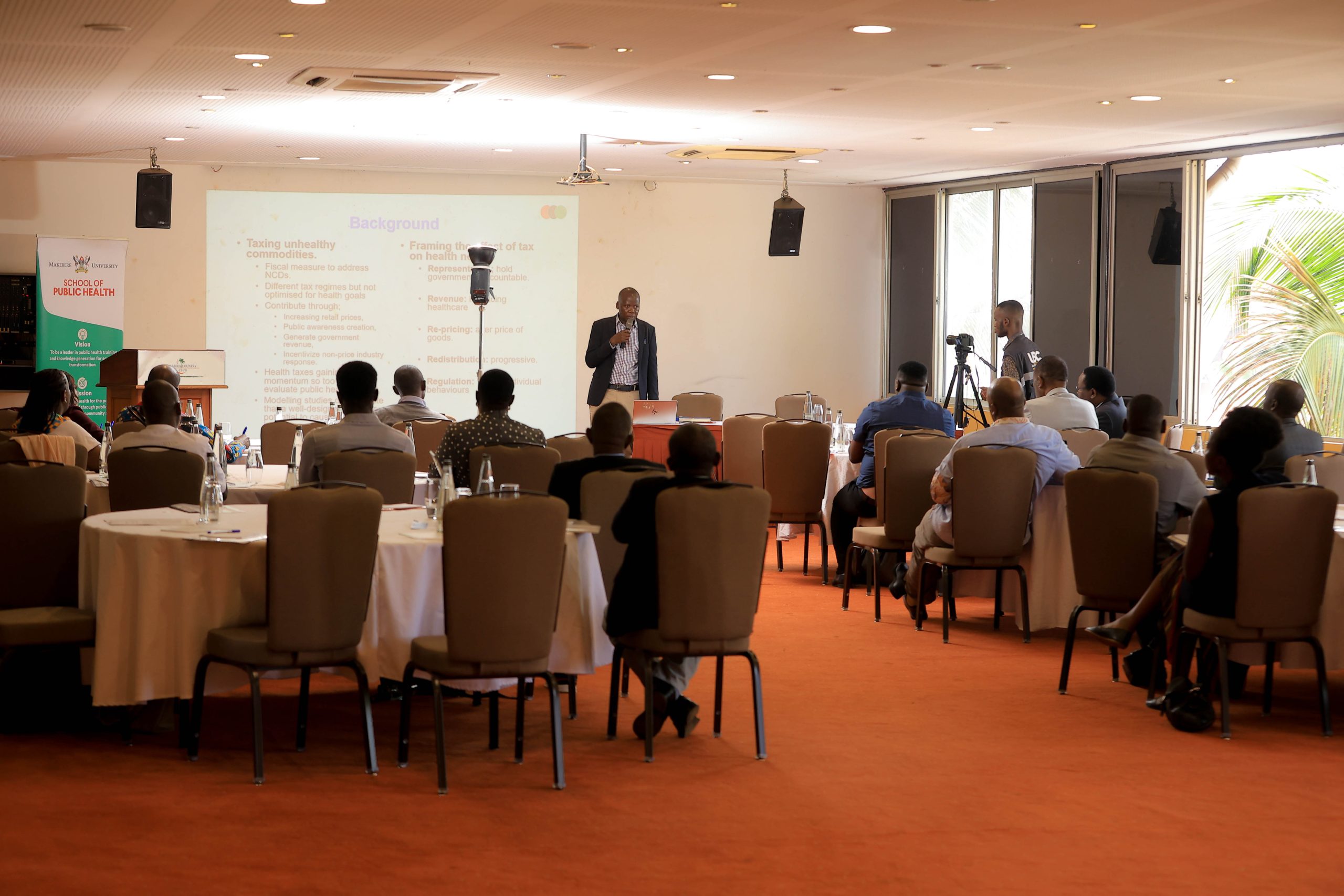
At a dissemination meeting on the political economy analysis of health taxes on unhealthy commodities in Uganda at Kabira Country Club in Kampala in late January this year, Dr. Ssengooba emphasized that, “When discussing NCDs, we need to be very practical.”
Adding that, “Currently, we rely heavily on a few donors and pharmaceutical companies, who provide us with a set of donated drugs each year. If these donors begin to reduce their support, similar to what we’re seeing with the US in the coming days, we will face even greater challenges. This is a critical issue: as we talk about NCDs, there’s no provision within the national budget to address medicine shortages. While there are healthcare professionals trained to manage these diseases, they may end up advising patients to purchase medicines from pharmacies—something that’s not affordable for many, especially those without financial means.”
The culprits? Cheap, sophisticated distribution channels and aggressively marketed unhealthy commodities. For instance, between 2015 and 2023, beer production rose by 42%, soft drinks by 67%, and cigarette sales surged despite taxes.
A presentation titled “Impact of Taxation on the Production, Sales, Revenue, and Consumption of Selected Unhealthy Commodities in Uganda: A Nine-Year Analysis” reveals a significant increase in the production of non-alcoholic beverages, particularly sugar-sweetened drinks, over the years. The highest production levels in the country were recorded during the 2022/2023 financial year. Richard Ssempala a Makerere University lecturer at the School of Economics and a current PhD candidate at Osaka Metropolitan University in Japan, who is also one of the researchers, attributes this growth to the rise in the number of factories and small-scale firms entering the market, coupled with low tax rates on these commodities.
Are Health Taxes, a “Best Buy,” Stalled by Competing Interests?
The World Health Organization (WHO) ranks health taxes on tobacco, alcohol, and sugary drinks among its top “Best Buys” to curb NCDs. Yet in Uganda, implementation faces fierce resistance. Dr. Henry Zakumumpa, a health systems and NCDs researcher at Makerere University, says industry lobbyists have impressed upon government technocrats, people, and commissioners at the Uganda Revenue Authority that when you increase taxes, then there will be distortion of the economy due to low consumption and the government won’t get those taxes, which he says is not true.
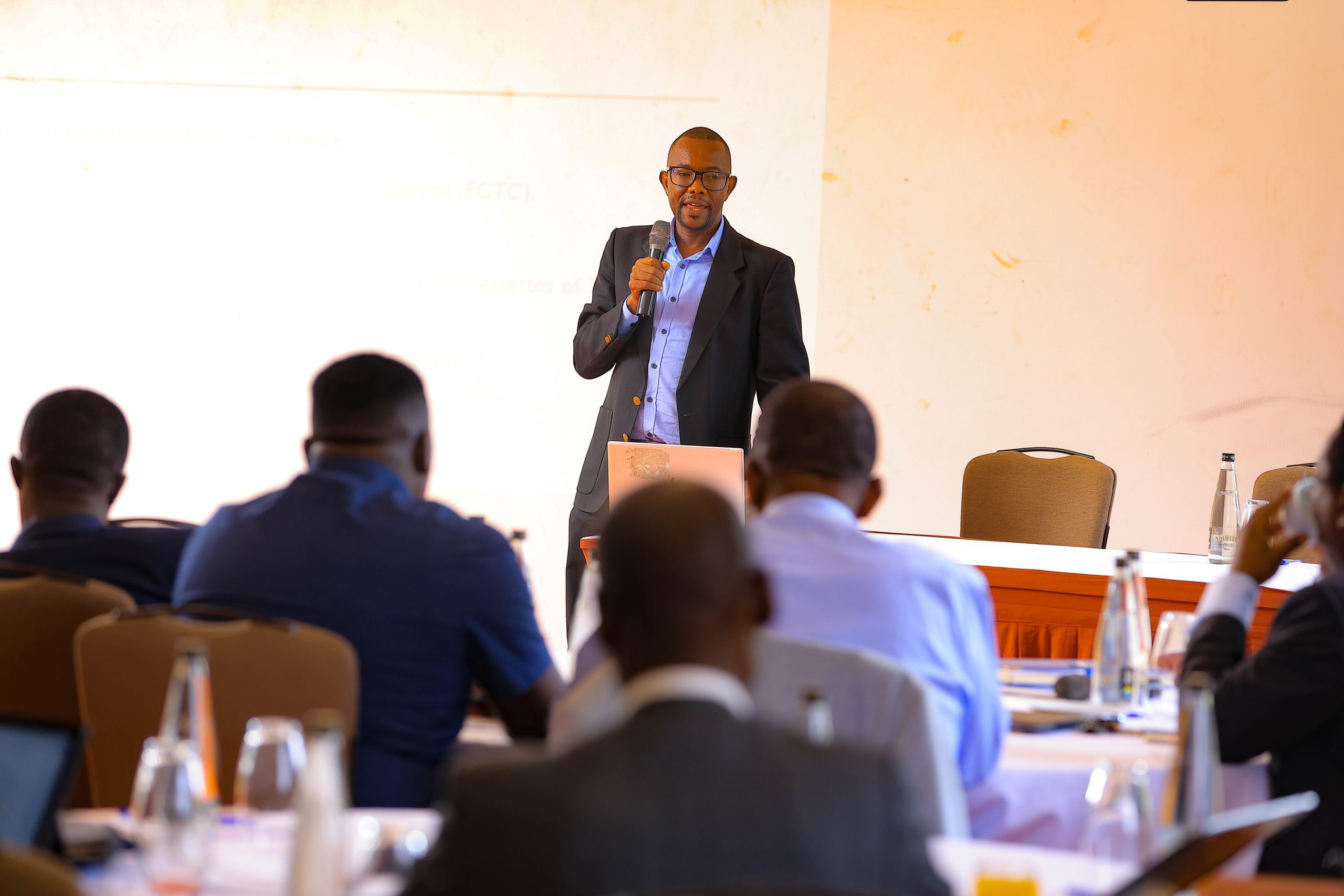
“When the taxes remain low, we as public health advocates realize that we shall not achieve our objective of reducing consumption of cigarettes and tobacco because they become affordable. Young people in secondary schools can afford cigarettes, which, of course, as we know, lead to cancer and heart disease. The tobacco industry is interested in maintaining taxes at a level where they’re ineffective, where they are so low that the prices are so low and young people can afford them,” said Dr. Zakumumpa.
But do health taxes work?
Studies that have been conducted elsewhere have shown that, when you increase taxes, the government increases revenue, and also the population reduces consumption of harmful products.
While the industry argues that taxes generate government revenue, a 2017 report by the Center for Tobacco Control in Africa (CTCA), based on a World Bank study, revealed that for every dollar the Ugandan government receives in tobacco taxes, it spends four dollars treating tobacco-related diseases. The government incurs costs at the Cancer Institute, Lung Institute, and Heart Institute, treating individuals with lung cancer, throat cancer, and heart disease linked to smoking in their youth.
“The industry has been successful in misinforming the public, even government officials, by scaring them that if they increase taxes, the economy will suffer and the government will lose revenue, which we have found is actually misinformation,” argues Dr. Zakumumpa.
Dr. Segujja explains, “Health taxes collide with national priorities like the industrialization growth trajectory that the government is pursuing and getting a bulk of the population from the subsistence to a cash economy. Manufacturers of alcohol, tobacco products, and sodas advance this as the rationale for their businesses and, along the way, were attracted to the country with tax incentives to contribute to this objective. Now, they argue new levies will kill jobs and take them out of business.” Industry lobbying has kept Uganda’s tobacco taxes at 30% of retail prices, far below WHO’s 70% recommendation.
The Chemical Hook
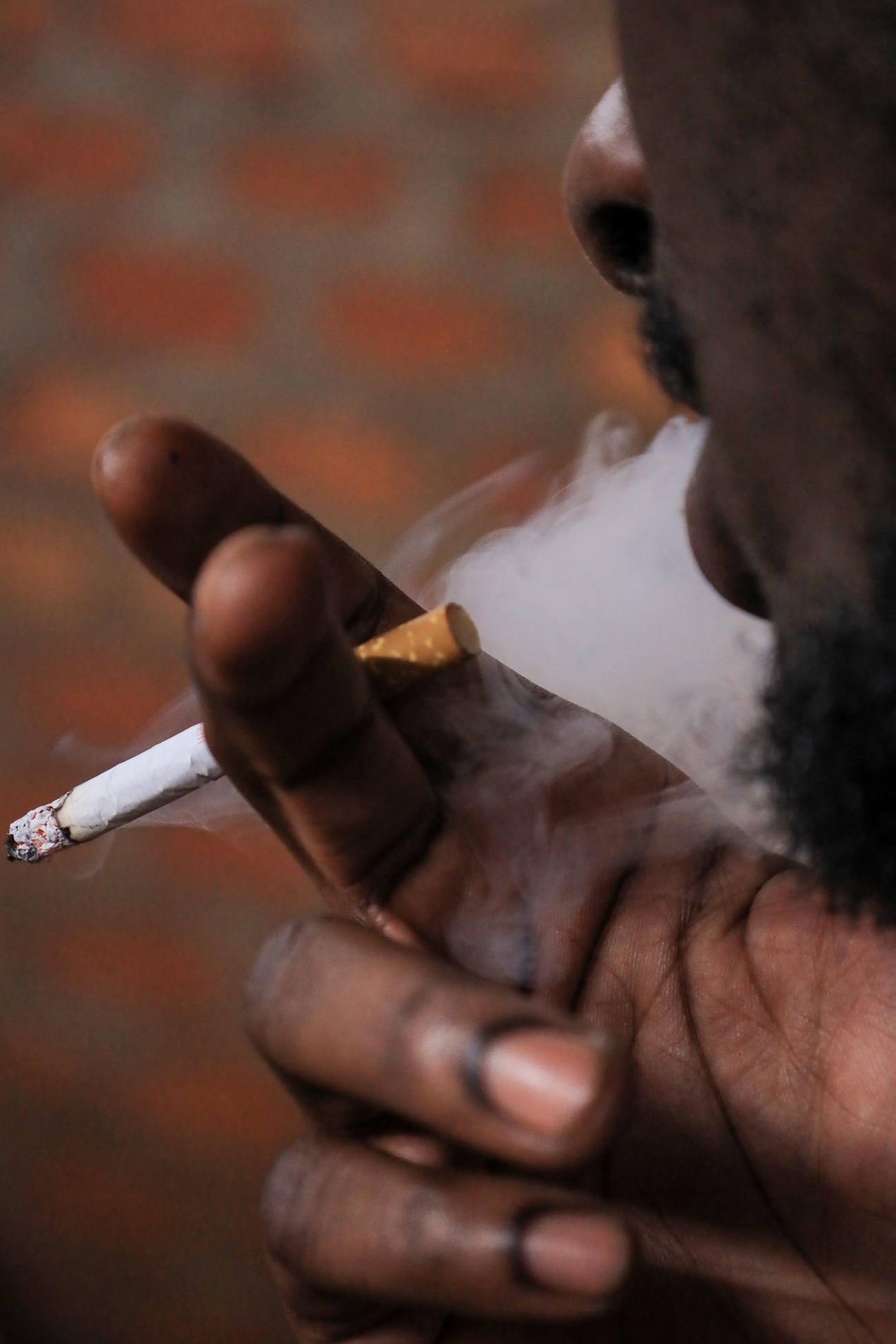
For the smokers, every puff injects their veins with 70 cancer-causing chemicals. Smoking doubles their risk of diabetes or that 90% of lung cancers trace back to this habit. But they know one thing: they can’t stop and this is how big tobacco engineers addiction in Uganda’s backyard
“Tobacco is one of the most addictive products,” explains Dr. Zakumumpa. “But do you know why? Manufacturers lace it with nicotine—a chemical trap designed to hook you for life.”
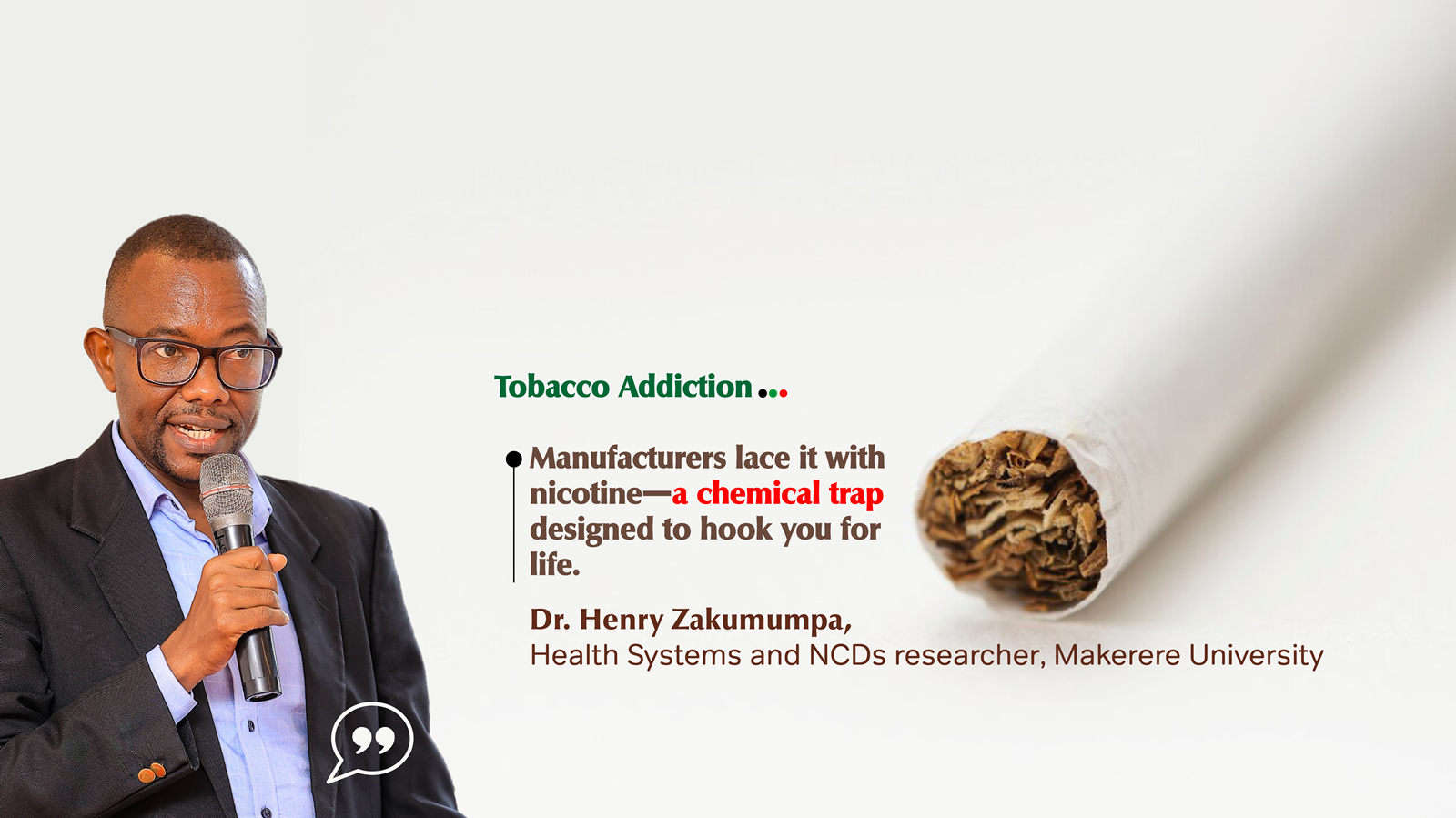
The irony is as bitter as the smoke. In rural Uganda, farmers have chewed raw tobacco leaves for generations without addiction. But in the hands of multinationals like British American Tobacco (BAT) and Marlboro, those same leaves are chemically altered. Nicotine, absent in natural foliage, is added like a sinister seasoning, transforming a plant into a predator.
Profitability of their businesses thrives through repeated consumption by a bulk of consumers.
“They want you as a tenant for life,” Dr. Zakumumpa says. “Even when your lungs scream, your wallet empties, or your blood sugar spikes. When the poor can’t afford cigarettes, they smoke less. The rich? They fund their own demise,” he adds notes.
But isn’t this the science of slavery?
Science demonstrates that nicotine is not only addictive, but also a master manipulator. It rewires brains to crave more, while tar and formaldehyde, some of the 7,000 chemical substances, carve silent graves in lungs. Yet Uganda’s tobacco taxes remain among the lowest globally, keeping packs accessible to teens.
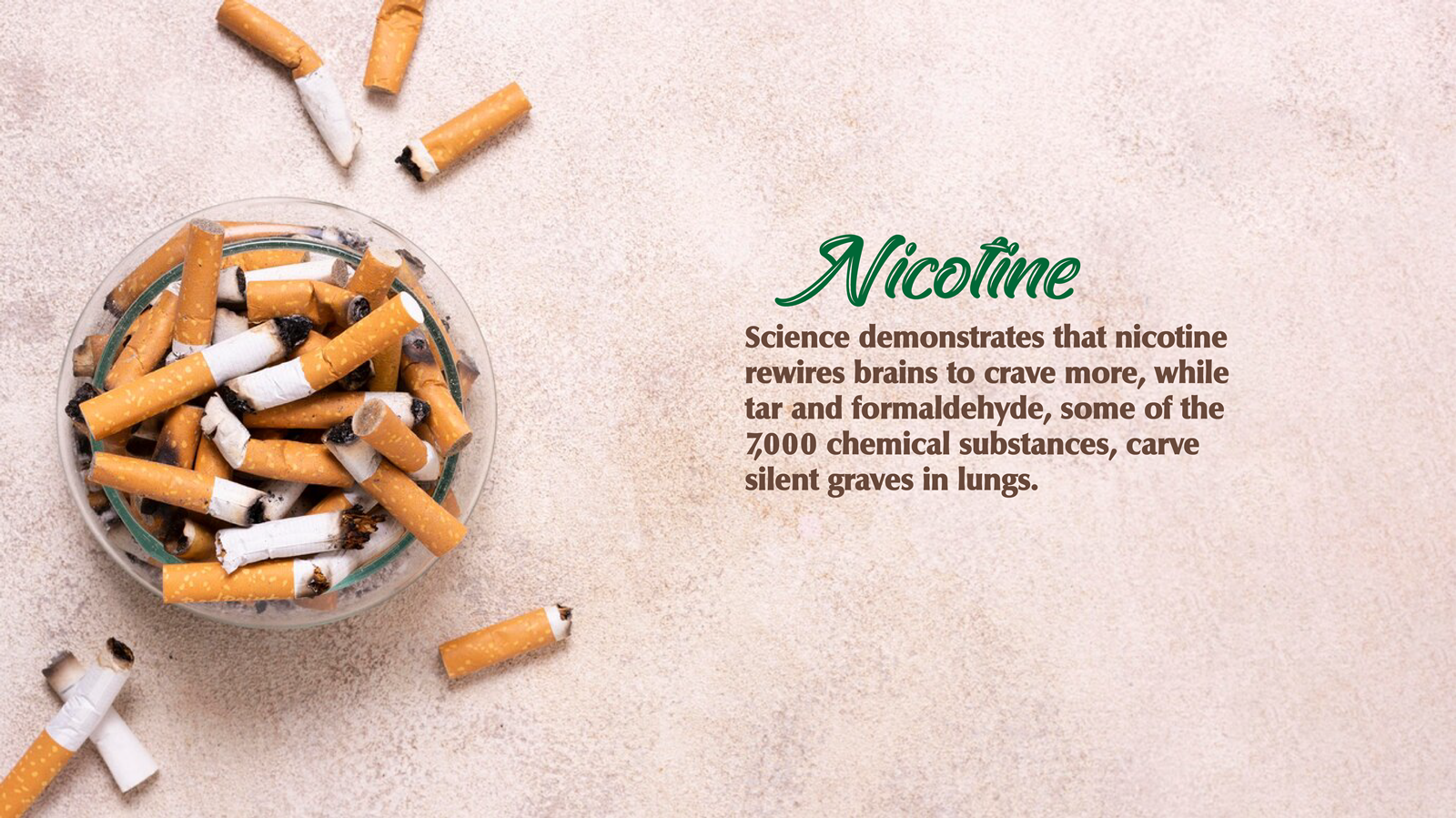
“This isn’t commerce,” Dr. Zakumumpa argues. “Its chemical warfare, and the casualties are in our wards, gasping for air.”
He advises those who are addicted to enroll in nicotine reduction therapies and healthcare treatment at centers designated to help people with tobacco addiction.
“There is something called the National Care Centre (NACARE); we have Serenity Centre Uganda. We have about five centers which treat people who have tobacco addiction and who want to leave tobacco because it’s a chemical addiction, so they should approach the School of Public Health, they can approach us researchers, we can link them to these centers and they will leave and drop this habit,” says Dr. Zakumumpa
Revenue vs. Health, the Fiscal Tightrope
Uganda’s dilemma mirrors a global challenge. While health taxes could reduce NCD risks and fund healthcare, policymakers fear economic fallout usually advanced by opponents of tax increases. “Taxes on unhealthy commodities are sensitive, fought against by companies”—acknowledges Ssempala. Yet data from his nine-year analysis demystified this: Production and sales of taxed goods like beer and sodas keep rising, even as revenues plateau. During COVID-19, sales dipped briefly but rebounded sharply.
The Ministry of Health’s Dr. Oyoo Charles Akiya remains pragmatic:
“We need compromise. If manufacturers won’t accept higher taxes, let’s mandate health warnings or limit marketing to children.”
Dr. Akiya is the Commissioner of Health Services-Non-Communicable Diseases, and he hopes there can be a path forward through coalitions, evidence, and political will. Despite hurdles, advocates see hope. South Africa’s success in taxing sugary drinks and Kenya’s tobacco levies offer blueprints.
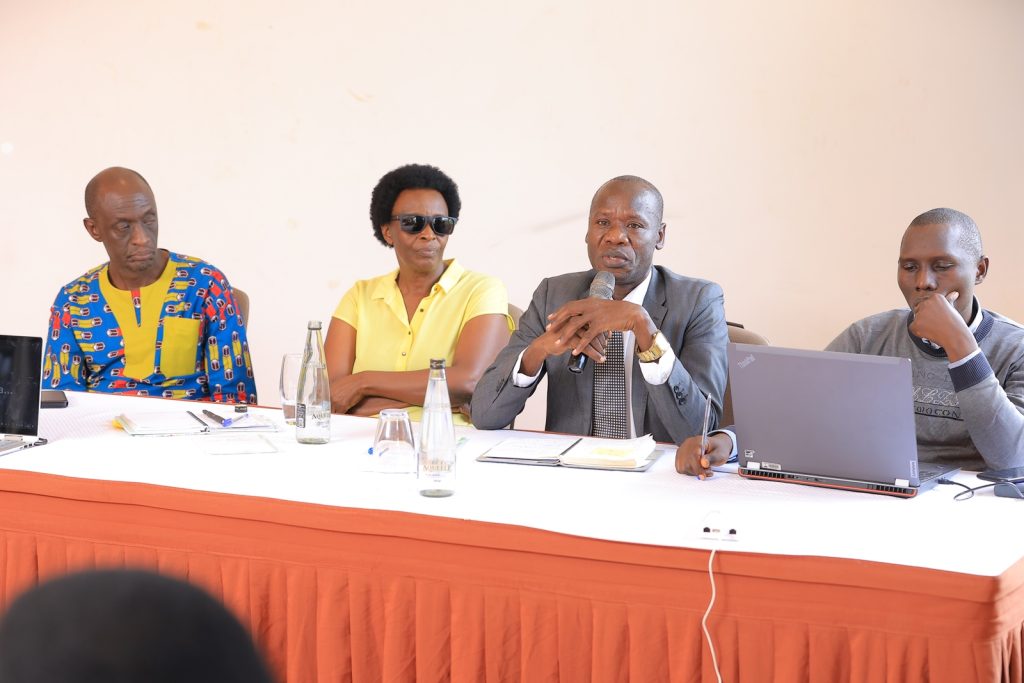
Regionally, a coalition of East African NCD managers is advocating for unified policies. The 4th Global NCD Alliance Forum, held at the Convention Centre in Kigali, Rwanda, on February 13, 2025, was the first of its kind in Sub-Saharan Africa. The event brought together 700 advocates, experts, and ministerial representatives from over 66 countries working in NCD prevention and care. This forum is a key global health forum as we race to the 4th UN High-level Meeting on NCDs, scheduled for September 2025 in New York.
“Change requires top-down pressure,” says Dr. Akiya.
With multinationals at the centre of manufacturing these commodities, exerting enormous pressure sometimes may prove difficult to confront as individual countries.
“We’re engaging the AU and UN to put NCDs on presidential agendas.” Locally, the Ministry of Health is mobilizing patients with lived experience: “They matter the most. The media plays a crucial role in this endeavor and holds significant importance for us. We cannot leave them out in these efforts. The leadership at the Ministry of Health, the minister, and the PS [Permanent Secretary] are all passionate about NCDs,” he added.
Is it a race against time or a behavioral issue?
As Uganda’s youth embrace processed snacks and tobacco, the clock ticks. “Every day without action, we lose more people to preventable diseases,” warns Professor Ssengooba.
The other day, Mubiru (not his real name) was jogging on the street, and a motorcycle taxi called Boda Boda knocked him, and he has just come out of the cast. He’s trying to manage NCDs; he got injured. At a Kampala hotel buffet, 28-year-old Miriam (not her real name) stares at her plate—a mountain of matoke, fried rice, boiled rice, vegetable rice, roasted gonja (plantain), and three golden potato wedges. “Finish it all,” her aunt insists. “Food is a blessing!” But Professor Ssengooba sees a different truth in these heaping portions: “Our plates have become battlegrounds. We pile carbohydrates like trophies—fried, boiled, mashed—while our bodies crumble.”
Uganda’s love affair with carbohydrates has turned toxic. Meals once centered on balanced staples like beans and greens now drown in oil and starch. “We’ve confused ‘tasty’ with ‘excessive,’” he says, adding that “at weddings, funerals, and even home dinners, its six carbohydrates competing on one plate. Why? Tradition says ‘more is generous.’ Science says, ‘more is deadly.’”
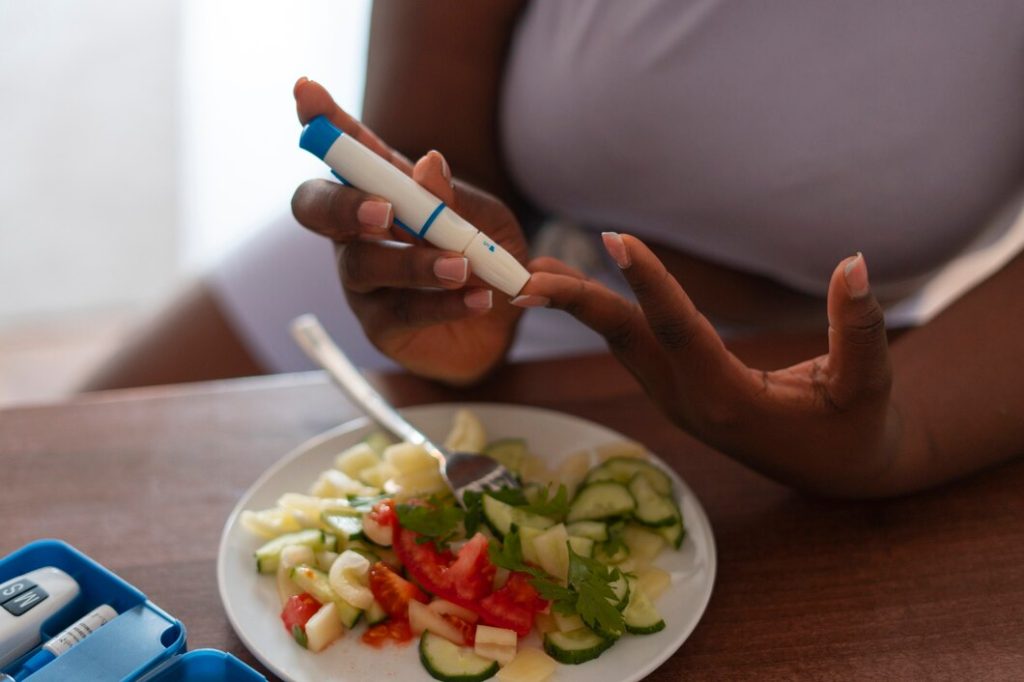
At what cost? Surging diabetes and hypertension rates. “We’re eating our way into clinics,” he warns. Yet change faces cultural roadblocks: How do you convince a nation that less on the plate isn’t disrespect—but survival? In this high-stakes battle between public health and profit, Uganda’s choices will shape a generation’s survival.
Davidson Ndyabahika is the Communications Officer, Makerere University School of Public Health.

You may like
-


CAES Presents Overall Best Performing Student in the Sciences & a Record 28 PhDs at the 76th Graduation Ceremony
-


Over 9,200 to graduate at Makerere University’s 76th Graduation
-
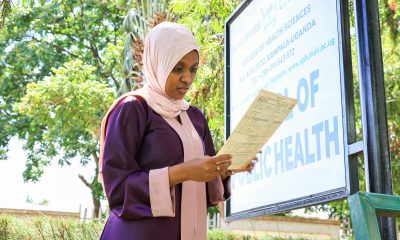

MakSPH Environmental Health Graduates Trained to Prevent Disease at Its Source
-


Philliph Acaye and the Making of Uganda’s Environmental Health Workforce
-


76th Graduation Highlights
-


Meet Najjuka Whitney, The Girl Who Missed Law and Found Her Voice
Health
MakSPH Environmental Health Graduates Trained to Prevent Disease at Its Source
Published
2 days agoon
February 24, 2026
In most health systems, attention turns to illness after it appears in clinics and hospitals. Environmental Health works earlier, often invisibly, by preventing disease before treatment becomes necessary. At Makerere University School of Public Health (MakSPH), this preventive philosophy shapes the training of students learning to manage health risks at their source, through sanitation systems, safer environments, community engagement, and evidence-based public health action.
This year, as MakSPH presents 29 graduands approved by the Makerere University Senate for the award of the Bachelor of Environmental Health Science (BEHS) degree, four outstanding students graduate with first-class honours. Their journeys, shaped by different personal histories and professional ambitions, provide a clear view of how the School prepares practitioners whose work begins long before patients reach health facilities. Through academic training, field practice, research exposure, and leadership experience, the programme equips graduates to address the environmental and social conditions that determine health outcomes across communities.

Environmental health occupies a distinctive position within public health practice. Rather than focusing primarily on diagnosis or treatment, practitioners work at the intersection of science, policy, and society, addressing risks linked to water and sanitation, food safety, occupational health, climate change, and urbanisation. The discipline demands technical competence alongside communication, systems thinking, and community engagement, capabilities that increasingly define modern public health leadership.
The journeys of Nakulima Bushirah, graduating with a CGPA of 4.58 on February 25, 2026, Mujurani Alphersiiru with 4.44, and Cherop Eric with 4.41, alongside Phillip Acaye, the cohort’s overall best student with a CGPA of 4.63, demonstrate how MakSPH shapes students from varied beginnings into professionals grounded in prevention. Their paths reveal a shared formation that links classroom learning with real-world health challenges and prepares graduates to prevent disease before it occurs.
Bushirah Nakulima’s Turn Toward Prevention

For Bushirah Nakulima, environmental health began during a period of uncertainty. The COVID-19 pandemic repeatedly disrupted her Bachelor of Pharmacy studies at Kampala International University, prompting reflection about the kind of health professional she wanted to become. A conversation with a family friend working in preventive health introduced an alternative path, one focused not on treating illness after onset but on preventing it altogether.
“When I applied to Makerere University in 2022, I was considering two career paths,” she recalled. “I prayed to Allah to guide me toward the best one. When I was admitted to the Bachelor of Environmental Health Science, I accepted it wholeheartedly, and I came to appreciate it even more as I studied.”
Her academic foundation had already demonstrated consistency. She progressed from Melody Junior School in Nansana, where she obtained aggregate eight in 2010, to Shuhada’e Islamic School in Nyamitanga, completing O-Level with 25 aggregates in 2016 and A-Level with 10 points in 2018. Pharmacy initially appeared the logical continuation, yet environmental health offered something broader in scale and impact.
“Environmental Health offered an opportunity to prevent illness and suffering before it occurs,” she explained. “It allows a single intervention, such as WASH or health education, to protect many people at once, and it provides flexibility to work across diverse environments. It offered freedom to operate in various settings, which truly connects with my personality since I love exploration.”
At MakSPH, classroom concepts quickly translated into practice. During her internship at Mukono Municipal Council, she conducted school health education sessions, participated in inspections of markets and abattoirs, and engaged communities facing sanitation challenges. Field exposure deepened her understanding of how environmental conditions directly shape disease patterns, reinforcing prevention as both a scientific and social responsibility.
Leadership further expanded her training. Serving as the 90th Female Guild Representative Councillor (GRC), she represented the School of Public Health in the Student Guild structure, facilitating engagement between students and School leadership on academic and welfare matters. The role strengthened her capacity for representation, negotiation, and collaborative problem-solving, skills central to public health practice, where advocacy and systems engagement are inseparable from technical expertise.
Graduating with a CGPA of 4.58, Bushirah’s research examined roadside vendors’ exposure to air pollution in Kampala, reflecting growing concern about occupational and urban environmental risks. She now plans to pursue advanced training in public health, building on MakSPH’s emphasis on evidence-driven and community-centred practice.
Cherop Eric’s Return to the Classroom

Eric Cherop’s journey into environmental health began not in lecture halls but in community service. Raised in Kapchorwa District, he was shaped by economic hardship and resilience, experiences that informed his commitment to community well-being.
He completed his Primary Leaving Examinations at Chema Primary School, a Universal Primary Education institution, attaining 24 aggregates in 2008. He later joined Sipi Secondary School, where he obtained 37 aggregates at Uganda Certificate of Education in 2012 and continued at the same school for A-Level, earning 8 points at Uganda Advanced Certificate of Education in 2014.
After earning a Diploma in environmental health sciences from Mbale School of Hygiene between 2015 and 2017, he entered public service as an Environmental Health Officer and Community Field Facilitator with Kapchorwa District Local Government. His work included sanitation campaigns, climate resilience initiatives, nutrition education, and household behaviour change programmes. Over time, field experience revealed the limits of practice without deeper theoretical grounding.
“I wanted to understand not only what works in communities, but why it works,” he explains. Enrolling in the BEHS programme at MakSPH in 2022 allowed him to connect practical experience with analytical training. Coursework strengthened competencies in environmental risk assessment, participatory engagement, and data-driven planning. Mentorship reshaped how he interpreted evidence.
“My lecturers helped me move beyond seeing data as numbers,” he said. “I learned to see it as evidence that guides decisions and improves accountability.” Graduating with a CGPA of 4.41, Eric now aims to advance evidence-driven leadership at the intersection of climate change, nutrition, and environmental health, ensuring interventions remain grounded in community realities.
Mujurani Alphersiiru’s Path into Environmental Health

For Mujurani Alphersiiru, Environmental Health arrived at an unexpected moment, when his academic future appeared uncertain. Financial pressures had begun to threaten the continuation of his Bachelor of Nursing Science studies at Kampala International University Western Campus, raising the real possibility that his university education might end prematurely. The turning point came when the government district quota admission list was released, offering him placement at Makerere University under Bunyangabu District and opening an alternative academic pathway he had not previously considered.
At the time, environmental health was unfamiliar to him. “I didn’t know what environmental health was,” he recalls. “But I celebrated because I had reached my dream university.” Orientation sessions and early coursework gradually reframed that uncertainty, revealing a discipline grounded in prevention, systems thinking, and public health policy. What began as an unexpected opportunity soon developed into a clear professional direction.
Serving as class president and 90th Male GRC for the School with Nakulima Bushirah, Mujurani organised student activities, mobilised community outreach initiatives, and advocated for improved learning environments. Balancing leadership responsibilities with academic performance required deliberate discipline and time management.
His educational foundation began at St. Augustine Butiiti Demonstration Primary School in Kyenjojo, where he scored 12 aggregates in 2014. He later attended Pride Secondary School in Mityana, attaining 25 aggregates at O-Level in 2018, before proceeding to Kibiito Secondary School in Bunyangabu, where he obtained 13 points at A-Level in 2021, performance that earned him government sponsorship for university education. At MakSPH, faculty mentorship further strengthened both his academic rigour and commitment to public service.
“Government sponsorship meant responsibility,” Mujurani said. “I had to plan my time carefully while remaining active in school programmes.” Graduating with a CGPA of 4.44, his interests now centre on governance and accountability within health systems, particularly strengthening the implementation of public health policies.
Training Prevention Professionals
Taken together, the three journeys demonstrate how MakSPH’s Environmental Health training converts diverse personal backgrounds into a shared professional orientation centred on prevention. Through interdisciplinary coursework, field placements, research mentorship, and leadership opportunities, students develop competencies that extend beyond technical knowledge to include systems thinking and public engagement.

The BEHS programme, established in 2000 within MakSPH’s Department of Disease Control and Environmental Health, remains the School’s only undergraduate degree and has trained more than 1,000 graduates who now serve across government institutions, non-governmental organisations, academia, and international health programmes. Its continued evolution reflects growing recognition that strengthening health systems requires professionals capable of addressing environmental risks before illness occurs.
The achievements of this year’s graduates, therefore, represent more than academic distinction. They reflect a model of training designed to prepare professionals whose work reduces the need for treatment by preventing disease at its source, reinforcing MakSPH’s role in shaping Uganda’s environmental health workforce.
Health
Philliph Acaye and the Making of Uganda’s Environmental Health Workforce
Published
2 days agoon
February 24, 2026
As Makerere University School of Public Health (MakSPH) presents 29 graduands on February 25, 2026, at Makerere University’s 76th Graduation Ceremony, for the conferment of the Bachelor of Environmental Health Science (BEHS) degree, the journey of the cohort’s best student provides a compelling window into both individual resilience and institutional impact. Philliph Acaye, graduating with a CGPA of 4.63, represents more than academic distinction. His story reflects the lived realities that shape many public health professionals in Uganda and shows how rigorous training can transform experience into leadership within health systems.

Education Shaped by Conflict
Acaye was born on October 2, 1993, in Wangduku Village, Palenga Parish, Pajule Sub-County, Pader District in northern Uganda, a region deeply affected by the Lord’s Resistance Army (LRA) insurgency in the early 2000s, where education and security often existed in constant tension. As a child, schooling unfolded alongside displacement and uncertainty, conditions that shaped an entire generation growing up during the conflict.
“Around 2002, before we had fully moved into the IDP camps, we often ran with our parents whenever there were LRA attacks,” he recalls. “But on several occasions, they caught us unaware. During one of the attacks, they abducted me and moved with me for close to seven kilometres, from Wangduku to Pajule Trading Centre in Pader. At first, they said I was too young to be moved with. I was around nine or ten years old. Later, I understood that someone among them personally knew my father and did not want me taken, so he used my age as the reason, and they left me behind.”

He narrates that several relatives and neighbours, including some of his childhood friends, were not spared, among them an uncle whose whereabouts remain unknown to this day. “If they had gone with me,” Acaye reflects quietly, “I could be dead, or I might not have studied.” The remark sits deep and places his graduation in context, not simply as personal success, but as the outcome of persistence through years when conflict repeatedly disrupted education across northern Uganda.
Between 2002 and 2006, his schooling continued inside Pajule Internally Displaced Persons (IDP) Camp, where families lived in overcrowded settlements and depended largely on relief food. Learning environments were unstable, teachers travelled under risk, and lessons were frequently interrupted by insecurity. Even within the camps, attacks remained possible. Education progressed slowly, but it continued, sustained by families and teachers who insisted that schooling remained essential despite uncertainty.
When communities gradually returned home, Acaye rebuilt his academic track record step by step. He completed Primary Leaving Examinations in 2007 with an aggregate of 19 and was the best pupil at Wangduku Primary School, at a time when enrolment remained low because many families feared returning to villages. He proceeded to Pajule Senior Secondary School, completing O-Level in 2011 with 31 aggregates, and later obtained 10 points at A-Level in 2013 from Kitgum High School.
However, his progression was shaped by consistent recovery after disruption, supported by relatives, teachers, community mentors, and educational assistance from Invisible Children, a post-LRA conflict recovery NGO led locally by Ms. Laker Jolly Okot, which supported his A-Level education.
Professional direction emerged during his training at the Mbale School of Hygiene, where he pursued a Diploma in Environmental Health Science from 2014 to 2016 and graduated with a strong CGPA of 4.4. The diploma opened immediate employment opportunities in community and humanitarian health settings back home, followed by service in local government. Today, he works as a Health Inspector in Kitgum District Local Government, implementing sanitation monitoring, infection prevention activities, and community health interventions. Practical experience strengthened his understanding of public health challenges but also revealed limits in technical depth that he felt required further training.
Training the Public Health Professional
His admission to MakSPH in 2022 through the government diploma-entry sponsorship scheme represented a deliberate academic decision rather than a career reset. He sought broader analytical skills and a stronger grounding in environmental health systems, particularly in areas of surveillance, planning, and evidence-based decision-making.
“I realised some technical aspects were not fully covered at the diploma level. I wanted to understand public health beyond implementation and learn how decisions are justified scientifically,” Acaye explained.

The sponsorship, he observed, transformed that ambition into possibility and remains central to how he understands his academic journey at Makerere University. “I am grateful to the Makerere University selection committee, the MakSPH selection committee, and the Government of Uganda for this opportunity. Opportunities like this are not guaranteed, and I recognise the trust placed in me to undertake and complete the three-year BEHS programme.”
The transition into university study was not seamless, though. His admission had come earlier than planned, and he began coursework without formal study leave while still tied to workplace obligations in Kitgum. Sustained support from district leadership, particularly Dr. Okello Henry Otto, the District Health Officer, eventually enabled him to secure study leave and concentrate fully on academic work. Now with stability came rapid academic improvement, supported by peer learning, faculty mentorship, and a strong curriculum that emphasised analytical reasoning alongside applied practice.
Acaye attributes his transformation to the programme’s academic culture rather than individual brilliance. “The programme helped me realise that what I was doing before was only a surface understanding,” he argued. “I learned to approach public health more deeply.” Exposure to research methods, he revealed, reshaped how he interpreted field experience and encouraged him to submit an abstract to an international academic conference, marking his transition from practitioner to emerging researcher.
For Mr. Abdallah Ali Halage, the MakSPH Coordinator of the BEHS programme, such outcomes reflect intentional design rather than coincidence. He noted that student success is rooted in a training philosophy that combines technical instruction with professional discipline from the moment students enter the programme. According to him, orientation focuses not only on coursework but also on expectations of conduct, independence, and responsibility. “When students join, we brief them on how seriously they must approach their academic journey,” he said. “That grounding helps shape their performance over time.”

Mr. Halage argued that while some high-performing students enter through diploma schemes, achievement ultimately depends on commitment and effort rather than background. He cited Acaye’s consistent curiosity and self-motivation as defining traits, noting that strong academic results tend to follow students who actively engage with the learning process.
“I congratulate Philliph and his colleagues upon attaining first-class honours and performing very well academically. Philliph has been hardworking and self-motivated. He has consistently shown a strong interest in his studies, and that commitment has helped him achieve this result. He has been a very good student,” Mr. Halage attested.
He added that the achievement reflects a broader culture within the programme. “Our students are disciplined and independent. Their commitment, together with support from the School management, the College and University leadership, has contributed greatly to their success.”

From Individual Achievement to Institutional Impact
The broader significance of Acaye’s achievement becomes clearer when placed within the evolution of the BEHS programme itself. Established in 2000 within MakSPH’s Department of Disease Control and Environmental Health (DCEH), the programme remains the School’s sole undergraduate degree and was among the earliest environmental health bachelor’s programmes in East Africa. In more than two decades, it has produced over 1,000 graduates, expanding professional capacity beyond diploma-level training and strengthening Uganda and the region’s environmental health workforce across government, non-governmental organisations, educational institutions, and points of entry such as airports and border services.
Mr. Halage explained that the programme helped redefine career pathways within the government of Uganda’s public service structures by introducing degree-level expertise into environmental health roles. Graduates now serve as Environmental Health Officers, Senior Environmental Health Officers, and technical specialists contributing to policy implementation and service delivery across multiple sectors. The academic pathway has also expanded vertically, with postgraduate training opportunities at MakSPH currently enabling graduates to progress into research, teaching, and doctoral-level specialisation, ensuring continuity within the discipline.

A Programme Shaping Regional Practice
The reputation of Makerere University’s Bachelor of Environmental Health Science programme is also increasingly influencing regional institutions. During a strategic benchmarking visit to MakSPH on July 30, 2025, Dr. Ratib Dricile, Dean of the Faculty of Health Sciences at Muni University, described the School of Public Health as a reference point for universities seeking to strengthen environmental health training in the region.
The main reason the delegation visited Makerere University School of Public Health was that Muni University remains a young and growing institution located in north-western Uganda along the borders with the Democratic Republic of Congo and South Sudan, where porous borders contribute to frequent cross-border diseases, many of which are preventable through strong environmental health approaches, Dr. Dricile explained.

“Makerere University, with over 100 years of institutional experience and 25 years running the Environmental Health programme, was the right place for us to benchmark, particularly in curriculum design, course content, programme structure, and implementation,” he said. “We were impressed by the work being implemented and gained more than we initially expected. By integrating these experiences, we believe the Muni University curriculum can become even stronger. The collaboration will allow us to adopt innovations built on Makerere’s long experience, and we believe that working together with Makerere University will strengthen Muni University institutionally and contribute positively to our university’s growth and ranking.”
It is within this institutional tradition, built over decades of training environmental health professionals across Uganda and the region, that Philliph Acaye’s achievement takes meaning. For him, graduating top of the class remains grounded in practical purpose rather than prestige. He views a first-class degree as an opportunity rather than an endpoint. Recalling guidance from his lecturers, he said strong academic results can open doors but must be followed by demonstrated competence. “A first class helps you get shortlisted,” he said. “After that, you must prove yourself.”

His immediate plans reflect that perspective. He is currently pursuing additional training in Health Services Management at Gulu College of Health Sciences while preparing for postgraduate study in either public health or environmental and occupational health. At the same time, he continues supporting pupils in his community and plans to mobilise resources to provide sanitary pads for girls at his former primary school, an initiative he believes will help reduce school dropout rates in rural areas.
Acaye’s journey, from disrupted schooling in an IDP camp to graduating top of MakSPH’s BEHS programme for the 2022 cohort, reflects the deeper purpose of public health education. As MakSPH presents its newest cohort for graduation this week, his story demonstrates how the programme turns lived experience into professional capacity, strengthening communities and health systems across Uganda and the region, one graduate at a time.
Health
Makerere University School of Public Health Graduates First Cohort of Cost-Effectiveness Analysis Short Course
Published
5 days agoon
February 20, 2026By
Mak Editor
Kampala, Uganda – The Makerere University School of Public Health (MakSPH) has marked a significant milestone with the graduation of the first-ever cohort of its Cost-Effectiveness Analysis (CEA) Short Course. The pioneering programme is designed to strengthen capacity in economic evaluation in Uganda and beyond.
The virtual graduation ceremony honored eleven (11) participants who completed the course. The cohort included professionals from academia, research institutions, government agencies, and non-state actors, reflecting the increasing demand for skills in economic evaluation across sectors.
The short course was developed and implemented by the Department of Health Policy, Planning, and Management (HPPM) in response to the increasing need for evidence-informed decision-making in a context of limited resources.
In her remarks during the ceremony, Assoc. Prof. Suzanne Kiwanuka, Head of the Department of Health Policy, Planning and Management (HPPM) at MakSPH, congratulated the inaugural cohort for completing what she described as a “critical and timely” course.
“With decreasing resources and rising demand for services driven by population growth and the emergence of high-cost technologies, decision-makers must make difficult choices,” she noted. “Cost-effectiveness analysis is no longer optional. It is central to conversations in the corridors of power.”
The CEA short course was designed to equip policymakers, researchers, and practitioners with both theoretical knowledge and practical skills in economic evaluation. Participants were introduced to key principles of health economics, costing methodologies, decision-analytic modelling, Markov modelling, sensitivity analysis, and interpretation of incremental cost-effectiveness ratios (ICERs).
According to Prof. Elizabeth Ekirapa, the course lead at MakSPH, this inaugural offering had been “a long time coming,” following years of discussions within the department about building local expertise in economic evaluation.
Delivered over 10 days through interactive online sessions, the course combined lectures, case studies, and hands-on modelling exercises using contextually relevant datasets. Participants were required to develop and present applied cost-effectiveness projects as part of their assessment, allowing them to translate theory into practice.

During the feedback session at the graduation ceremony, faculty emphasized the importance of clarity in defining study perspectives, selecting appropriate outcomes, and aligning research questions with modelling approaches.
Dr. Chrispus Mayora, one of the facilitators, highlighted the need to carefully select outcomes that directly reflect the intervention being evaluated. “When thinking about outcomes, ask yourself: Is this aligned with what I want to study? Interesting outcomes are not always the most appropriate ones,” he advised.
Participants were also encouraged to select modelling techniques such as decision trees or Markov models based on the research question and the nature of the disease or intervention under study.
Prof. Ekirapa described the graduates as “trailblazers,” noting that their feedback would shape future iterations of the course. “When you are the first cohort, you are like pioneers,” she remarked. “We are committed to improving this course to ensure it becomes a world-class programme.”
For many attendees, the graduation ceremony was a new experience, as certificates were awarded virtually an approach that participants welcomed as innovative and inclusive.
“Cost-effectiveness analysis enables us to maximise value for money,” noted Dr. Crispus Mayora of MakSPH. “It allows decision-makers to compare interventions systematically and ensure that limited resources achieve the greatest possible benefit.”
The programme aligns with Makerere University’s broader mandate to provide high-quality training that responds to national and regional development priorities. Participants who successfully complete the course receive a certificate signed by the Dean of the School of Public Health.
As the ceremony concluded, faculty encouraged continued engagement beyond the classroom. Graduates were urged to refine their project ideas and collaborate with the department in advancing research and policy discussions.
The successful completion of the first CEA short course marks an important step in building a cadre of professionals equipped to conduct rigorous economic evaluations. With plans to expand and refine the programme based on participant feedback, the HPPM department under MakSPH is positioning itself as a regional leader in health economics and policy analysis training.
Trending
-

 Humanities & Social Sciences3 days ago
Humanities & Social Sciences3 days agoMeet Najjuka Whitney, The Girl Who Missed Law and Found Her Voice
-

 Health1 week ago
Health1 week agoUganda has until 2030 to end Open Defecation as Ntaro’s PhD Examines Kabale’s Progress
-

 Agriculture & Environment6 days ago
Agriculture & Environment6 days agoUganda Martyrs Namugongo Students Turn Organic Waste into Soap in an Innovative School Project on Sustainable Waste Management
-

 General1 week ago
General1 week agoMastercard Foundation Scholars embrace and honour their rich cultural diversity
-

 Health2 weeks ago
Health2 weeks agoCall for Applications: Short Course in Molecular Diagnostics March 2026